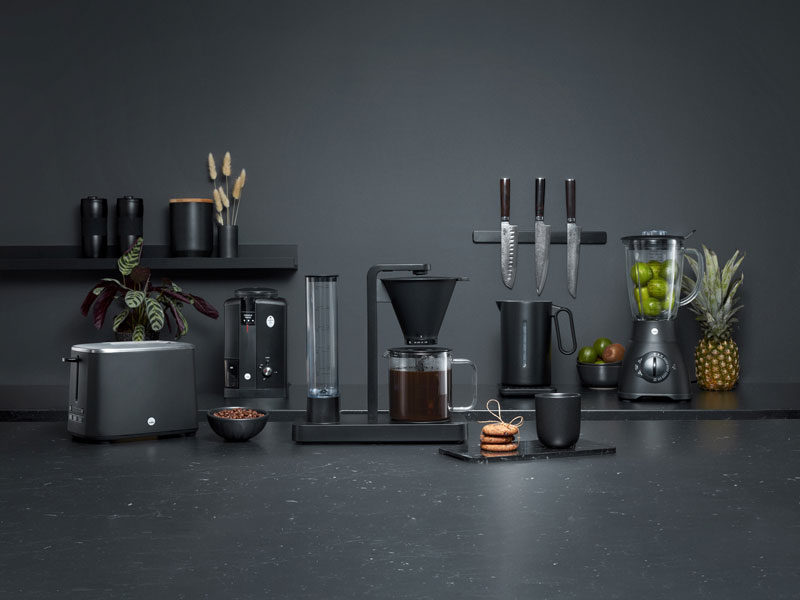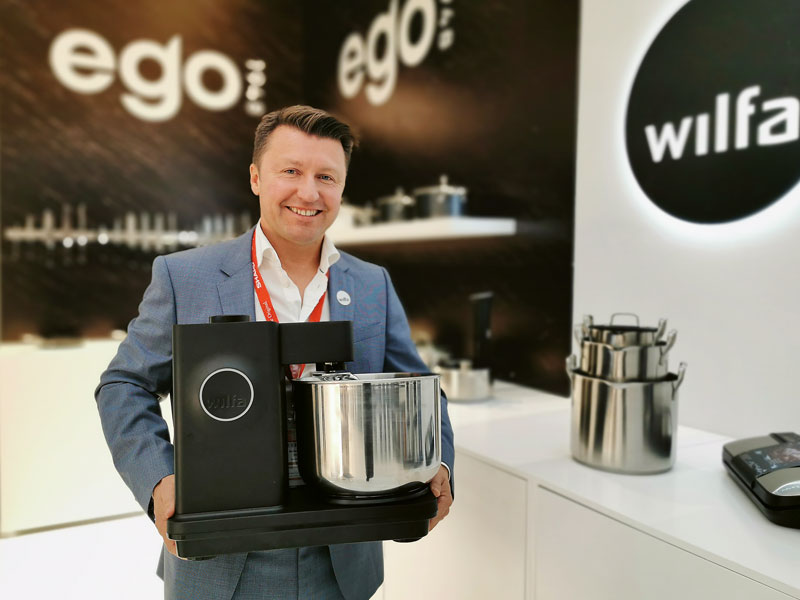
Today Wilfa is the market leader in the small kitchen appliances sector in the Nordic countries, selling to all major retailers in Norway, Sweden, Denmark and Finland. It is also attacking export markets with gusto, starting Wilfa Germany GMBH in 2020, and opening up distributors in the UK, Netherlands and Poland and, in 2022, Spain, France, Switzerland and Austria.
Hoff joined Wilfa, which is based in Oslo and was founded in 1948, just after graduating from the Norwegian school of business and economics and the University of Trier. His first role was working as a controller in Hong Kong, learning how the factories operated that made the products Wilfa sold. When he returned to Norway he worked as a product manager, then as a key account manager, and also as a marketing manager.
This wide range of roles, Hoff says, “has given me a complete understanding of the whole company, which I have used to create business where others haven’t been able to see the opportunities. With good understanding of consumers need, our retailers need and how our factories work, I have been able to find new categories, develop products at a quicker pace and give confidence to our retailers that we are the experts to be listened to. This has given us great opportunities.”
Those skills were needed when the company’s then-CEO left, taking one of its agencies with him. “Since I had a good understanding of what was possible to do, I landed a new agency to replace it quickly,” Hoff says. Within a few years, Wilfa had built the new brand to be a market leader, only for the brand owner to decide to do it all themselves. Again, Wilfa found a new agency, for Dyson, taking that brand from three percent market share in 2015 to over 50 percent in 2019. Once again Dyson decided to do its own marketing and distribution, and Wilfa lost almost 50 percent of its turnover.
We have built many market-leading brands from zero
At this point, Hoff says, “we decided that it was time to build our own brands instead.” The company launched E-way electric scooters, a full assortment of kitchen knifes and pots and pans under the name of EGO, and a host of other new Wilfa products. “By 2020, we had recovered almost 100 percent on turnover and we delivered an even higher EBITDA than when we had in 2019,” Hoff says. “So our strategy now is not to have too much risk in foreign brands and we only take in external brands when there are categories we can’t do ourselves.”
Wilfa, Hoff says, “has an extreme focus on customer experience. While most of our competitors are just making another coffee maker, we ask ourselves, ‘how can we help consumers making better coffee? What are the pain points that they know, or don’t know about, when making coffee?’ Then we include experts on the category, our fantastic engineers and great category team to find out how we can avoid these pain points.
“This means that our products very often have a smart solution which helps the consumer succeed better using our products. We are also less focused on the cost of the product when making the solutions, so we often end up with a more upscale product, but we do so in order to make the best product in the market. This led us to win 32 ‘best-in-test’ awards in 2022.
“The reason for being best-in-test, we believe, is that we go to extreme lengths to make the best product possible without being hindered by price focus. This way we ensure the product becomes as good as it can be before we launch it.”
Wilfa still sources and distributes “already produced” products, “like many of our competitors, but we do less and less of this due to we don’t believe this is a sustainable position for the future, with private labels, and Chinese factories going direct to the market,” Hoff says.
“What separates Wilfa from other importers, is that we always strive to develop the best products, and we like to challenge the market leaders within each category. We have done so to challenge Oral-B on electric toothbrushes, Moccamaster on coffee makers, Kenwood on kitchen machines, and we will continue to do this to give consumers the best possible product. Wilfa is already the market leader in many categories such as waffle makers – nine years in a row – coffee makers, coffee grinders, ice-cream makers, ice cube makers, blenders, sandwich makers, stickmixers and humidifiers.

“Another thing that separates us from many of our competitors is that we have a stronger focus on concrete environmental changes on our products. Because of this, we implemented FSC [Forest Stewardship Council] paper on all our instruction manuals, gift boxes and mastercartons, we changed our products to be better so we could increase our guarantee from two years to five years, we removed 18 tons of styropore, became environmental lighthouse approved and now we are doing a complete life cycle analysis on our products so we can see how we can become carbon-neutral by 2025.
“We have built many market-leading brands from zero. Unfortunately, when doing so, the brands tend to want to take over by themselves. This has led Wilfa to have quite a bumpy ride, with some years of good profit and other years with heavy losses. This has given me a good understanding of the implications of sales, margins, costs and how we can avoid such challenges happening in the future.
“Also, working with global leading brands have given us a good understanding of the market, how large corporations do business, and we are trying to take the best from this and implement those lessons in our organisation. Wilfa is most likely the most agile company in the industry, and we take the benefits of working partly like the larger companies, and combining this with the flexibility of a smaller company. And we operate with a very flat organisational structure, every one can give their input on things, so we can make quick decisions.
“Since we have quite a few new people and we work in a changing industry, I have had to be very much involved in operational tasks. I am a leader who is very much involved in all details. This is especially during the last few years, as we have hired a lot of new people in our organisation to help us achieve our goals. We present our strategy overview to the whole organisation, while trying to break down each project to each employee so they understand their role in the big picture, and understand what their contribution is. We also inform all employees openly where we are, what the challenges are and how we will cope with these.
Our products very often have a smart solution which helps the consumer succeed
“We always have good discussions about potential and risk before we go into a new project. All category managers must make business plans, which we go carefully through and check out with our experienced country managers. This way we ensure that costs are under control, as well as securing the market potential.
“Our strategy plan is very detailed, with concrete projections and timelines. The progression is measured in our management meetings to ensure we are on track, and if we need to do amendments, we do so in the management group. We are clear about our financial targets, environmental targets, product innovations, guarantee costs, customer satisfaction KPIs, brand awareness and brand preference, forecasting and employee satisfaction. These targets have been broken down to more concrete projects and contain tasks given to each employee within a concrete timeline, with concrete KPIs and bonus models to help motivate them to work together against our common goals.”
Hoff is committed to a role that continues to be more hands on than many company bosses might be comfortable with: “With the great opportunities which lie in front of us, I believe my main task is to ensure that we have the financial strength, the organisational resources and competencies and the strategy plan to make this come true. I will still be quite operational, as this separates me from many other CEOs in the industry. This has always given me a unique understanding of what is going on in the industry, with our suppliers, our customers and in the organisation.”
Despite all the problems of the global economy, Hoff is realistic but optimistic: “Of course, we are also challenged by the current situation. Freight costs are extremely high, raw material pricing is increasing, and with the current situation in Ukraine and with all prices on power, gasoline and other goods increasing, the market is quite tough.” However, he says: “In 2021, we had a turnover of €55m, and our target for 2025 is to reach €100m.
“This, we believe, will be mainly driven by new markets, new categories which we will launch and taking market share by launching more and more interesting products. We will also move many of our products over from mechanical products to app-based products with a consumer-friendly solution.”

